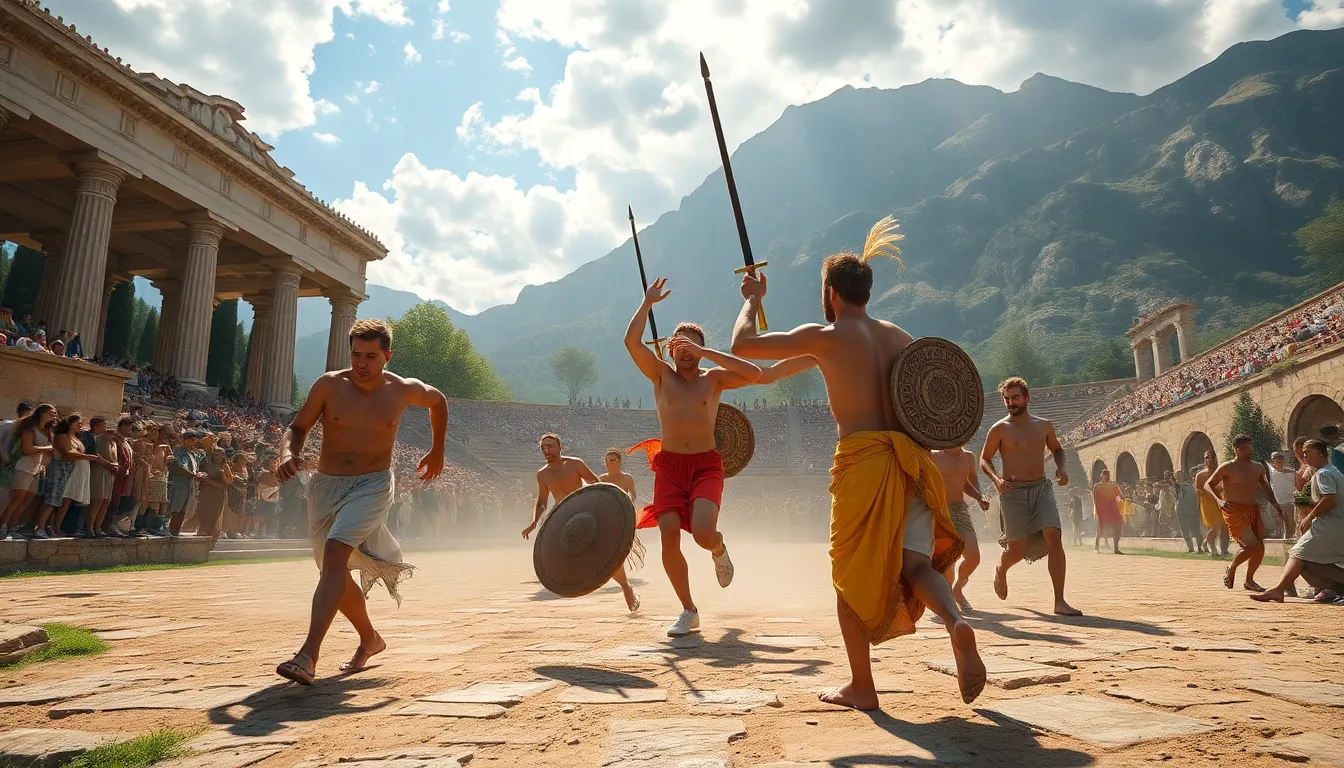The Importance of Athletic Competitions in Greek Festivals
I. Introduction
Greek festivals were vibrant cultural events that played a significant role in the social and religious life of ancient Greece. They were occasions for celebration, worship, and community gathering. Among the various activities that took place during these festivals, athletic competitions stood out as a vital element, reflecting the values and beliefs of Greek society.
The significance of athletic competitions within these festivals cannot be overstated. They not only showcased physical prowess but also reinforced communal bonds, honored the gods, and celebrated human potential. This article aims to explore the historical context, cultural significance, types of events, economic impacts, social benefits, challenges, and the future of athletic competitions in Greek festivals.
II. Historical Context of Athletic Competitions
The origins of athletic events in ancient Greece can be traced back to religious festivals dedicated to the gods. The most renowned of these competitions is the Olympic Games, which began in 776 BCE in Olympia. These games were held in honor of Zeus and featured various athletic events that attracted participants from all over the Greek world.
Other key festivals that featured athletic competitions included:
- Pythian Games – Held in Delphi in honor of Apollo.
- Nemean Games – Celebrated in Nemea, also in honor of Zeus.
- Isthmian Games – Conducted near Corinth, dedicated to Poseidon.
Over the centuries, these competitions evolved, introducing new events and expanding the participation base. While initially exclusive to male athletes, the inclusion of women in some competitions began to emerge, reflecting changing societal norms.
III. Cultural Significance of Athletic Competitions
Athletic competitions in Greek festivals played a crucial role in fostering community and unity among the participants and spectators. These events provided a platform for individuals from different city-states to come together, fostering camaraderie and mutual respect.
Moreover, these competitions celebrated physical prowess and the human spirit. Athletes trained rigorously, embodying the Greek ideal of ‘arete’, which represents excellence and virtue. This pursuit of excellence was not only physical but also moral, as athletes were expected to demonstrate virtues such as courage and honor.
Additionally, athletic competitions were deeply connected to Greek mythology and religious practices. Victories in these competitions were often seen as blessings from the gods, and winners were celebrated as heroes, receiving laurels and admiration from their communities.
IV. Types of Athletic Events in Greek Festivals
Greek festivals featured a variety of traditional athletic events, showcasing diverse skills and talents. Some of the most popular events included:
- Running: Various distances, including sprinting and long-distance races.
- Wrestling: A test of strength and technique, with different styles and rules.
- Pentathlon: A combination of five events: running, long jump, discus throw, javelin throw, and wrestling.
In modern adaptations, non-traditional events have emerged, such as relay races and team sports, emphasizing inclusivity and broadening participation. Furthermore, categories for different age groups and genders have become increasingly important, allowing for a more diverse range of competitors.
V. Economic Impact of Athletic Competitions
The economic impact of athletic competitions extends beyond the immediate festivities. These events attract tourism, boosting local economies through increased visitor spending on accommodations, food, and entertainment. Additionally, local businesses often benefit from the influx of participants and spectators.
Sponsorship and funding opportunities arise from the organization of these competitions, providing financial support for communities. Local governments and organizations can leverage these events to promote their regions and enhance their cultural heritage.
Long-term benefits include the establishment of annual events that contribute to ongoing economic growth and community pride. By hosting athletic competitions, communities can create lasting traditions that resonate with both residents and visitors.
VI. Social and Educational Benefits
Athletic competitions promote essential values such as teamwork, discipline, and perseverance. Participants learn to work together toward common goals, often forming friendships that extend beyond the athletic arena. This spirit of collaboration fosters a sense of belonging and community.
Moreover, these events provide opportunities for youth engagement and skill development. Young athletes can cultivate their talents while learning the importance of hard work and dedication. Educational programs associated with athletic competitions can also encourage personal growth and healthy lifestyles.
Athletic competitions further foster intercultural exchanges as participants from various backgrounds come together to compete. These interactions promote understanding and respect among diverse groups, enriching the cultural fabric of the festival.
VII. Challenges Facing Athletic Competitions in Greek Festivals
Despite their historical and cultural importance, athletic competitions in Greek festivals face several challenges today. One significant concern is the modernization and commercialization of these events. As festivals strive to attract larger audiences, there is a risk of overshadowing traditional values and practices.
Additionally, balancing tradition with contemporary interests can be challenging. Organizers must find ways to honor the historical significance of athletic competitions while adapting to modern expectations and preferences.
Ensuring inclusivity and accessibility for all participants is another critical challenge. Efforts must be made to accommodate individuals of varying abilities and backgrounds, fostering an environment where everyone can participate and enjoy the festivities.
VIII. Conclusion
In conclusion, athletic competitions are a cornerstone of Greek festivals, carrying immense historical, cultural, and social significance. They serve as a celebration of human potential, community spirit, and respect for tradition. As we look to the future, it is essential to preserve and promote these traditions, ensuring that they continue to thrive in Greek culture.
By recognizing the importance of athletic competitions and addressing the challenges they face, we can foster a vibrant environment where these events can flourish for generations to come.




